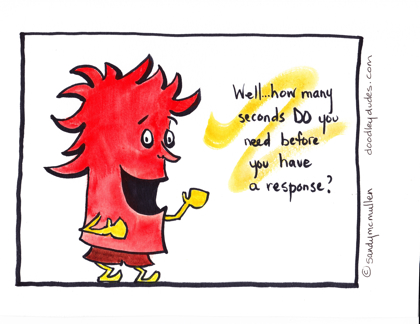
by Sandy | Aug 14, 2018 | Best Practices, MBTI Facts
Although my main interest in using assessment tools falls in the realm of understanding oneself, improving communication is another reason to embrace the information that the MBTI provides.
The basis of successful communication is rapport. Rapport occurs naturally when you feel in sync with another. We have all experienced those times when you can complete another’s thoughts and you just know that this person is “with” you. You can also see the rapport between others in social situations when people are turned toward each other heads titled at the same angle. While rapport occurs naturally when you feel that someone is “like” you are, it can also be helped along when you notice that you are out of sync.
At these times when you don’t have rapport the first thing to do is STOP trying to communicate the content of your message and get the alignment of rapport established. Without it the person is unlikely to hear you.
Here’s where you can consciously work with what you know about the MBTI. I have to admit that this is not my strong suit but I know that it is very helpful; for example, my husband has a preference for Sensing and my typical ENFP conversational style takes the kind of leaps that people with a preference for Intuition often make. When I notice that he has “gone to the beach” in his head because of my style I can focus on completing my story without all of my fascinating (to me) detours.
Shawn Bakker of Psychometrics Canada has a terrific article with tips to look for to recognize another’s MBTI preferences. You can use these signals to understand how to reestablish rapport if your style doesn’t match the other person’s preferred communication style. As an example Shawn points out that the person with a preference for Introversion may have a quieter voice. The Extravert can consider then adopting a quieter tone than they might use otherwise.
How you say things matters as much as what you say.
I’ll bet you have some conversational pet peeves – Love to hear what they are !!!!

by Sandy | Aug 14, 2018 | Best Practices, MBTI Facts
I love how entrepreneurs think and take action. The Ready, Fire, Aim approach they often take typically hits the mark even though occasionally it can cause some grief. However, when entrepreneurs get stuck and the momentum stalls, for whatever reason, it can get UGLY.
I was talking to such an entrepreneur (SP temperament) in such a stuck place who was finding it difficult to know what to say to clients who were complaining about something out of this individual’s control. People were making erroneous assumptions about this person’s working relationship with a business associate who was responsible for the problem area in question. This entrepreneur was like a deer in the headlights not knowing quite what to say because they had the inside scoop. However correcting any misconceptions about the division of responsibility would make both parties look bad and not satisfy the client. Besides which it would just feed any existing resentment by playing the BLAME game. The only responsible position was to take 100% responsibility to the client but it wasn’t pleasant.
My thinking went to a need for recreating the business agreements with this associate. This could have been a lengthy negotiation.
A third person (ENTJ) in the conversation suggested simply saying to the client “Thank you for your feedback. We will look into that and get back to you with some ideas.” I was quite taken aback for a moment until I realized that my approach could have been over-complicating things and possibly erecting even more barriers. This simple response would respect the client and provide an opportunity for the entrepreneur to maintain their momentum.
In focusing on providing for the client these associates might have an opportunity for some honest conversation to sort out their relationship from the bottom up. It might not require a big formal re-negotiation if a series of smaller conversations could achieve the same result.
Are you aware of areas where you over-complicate matters?

by Sandy | Aug 12, 2018 | Best Practices
One great conversation over the weekend centered on people who are just “too much.” Typically that means they are too much for other people to deal with. They might be too loud, too peppy, too emotional, too aggressive, too confident … fill in your word of choice.
This was my daughter’s phrase and I asked her if she belonged to this club. We laughed because Karen used to describe herself as a “big feeler.” The gift of this is her ability to be in a conversation with anyone no matter how challenging the topic. She doesn’t deflect or change course when encountering heavy emotional territory, she steers fearlessly for the eye of the storm, allowing others to express and consequently move beyond the “touchy” places. She comes by this honestly, apparently, because her sister and her mother are also club members from time to time. (Okay okay I admit to crying during commercials.)
There is a downside to being “too much.” People give you messages either directly as in “You’re too much!” or ”Stop being so emotional” or indirectly by backing away, averting their eyes or other non-verbal messaging. This holds true for people who are too loud, too friendly, too assertive but some of the club are immune to other people’s responses. Others in the club end up feeling that they don’t fit in and this can cause them to withdraw, act out or alter their behaviour.
It occurred to me that Hans Christian Andersen’s tale ‘The Ugly Duckling” captures the alienation we feel when we aren’t like others. Trying to conform may seem like the prescribed solution, but ultimately it doesn’t work if it results in feeling like you are abandoning yourself.
Here are three suggestions for anyone who feels that they are “too much” at times.
- Accept yourself just the way you are. I’m not implying that you might not wish to change some aspects of how you show up to others. Perhaps you’ll change or maybe you won’t. The truest way to have change happen naturally is to start by looking at “what is” and simply being okay with that. If you force yourself to adapt you may end up in resistance and further embedded in “too much” as a result of undue stress.
- If there is a person or group of people in your life who give off messages that they don’t accept you as you are, think about what you want to do about that. Letting people constantly criticize and judge you is a recipe for stress. It is okay to outgrow friends, colleagues even lifestyles. They don’t need to be blamed or made wrong. It may simply be the time to move on.
- Develop a practice of being a neutral yet compassionate observer of your behaviour. Notice those “too much” episodes without judgment. “How fascinating!” “How interesting” “Look at this dynamic”. This simple mindful habit (skill), anchored in acceptance, is one of the most powerful contributors to change.

by Sandy | Aug 12, 2018 | MBTI Facts
During a conversation with an Extraverted salesperson who did not know the Myers Briggs Type Indicator, I described the differences between Introversion and Extraversion and the internal processing of those with a preference for Introversion.
At first a look of surprise crossed their face and this was followed by an immediate aha moment. They went on to describe a conversation that had just occurred that morning with a client. The salesperson had been using discovery questions to explore the needs of this client and was getting MUCH MORE silence than response. The silence compelled the salesperson to push – asking even more questions. As this Extravert listened to me describe how the Introvert has a dominant function that is in the internal world not the external, they suddenly were able to reframe the clients behaviour from “being difficult (on purpose)” to being the Introvert’s natural way of reflecting before speaking. They were thrilled to have the suggestion to give the person time to reflect before pushing for an answer before the person has had a moment to ponder their response

by Sandy | Aug 12, 2018 | MBTI Facts, Other Personality Assessments
My first response to this question about Extroverts capability to listen was an automatic and very vocal ABSOLUTELY.
In saying that I recognize that the MBTI simply looks at preferences and not capability but it can also point out potential “blindspots” and “By George” I think I just discovered one.
Lesley Parrott, queen of the Insights Discovery inventory, a preference based system built on the work of Jung, very kindly pointed out that Extroverts often want to align with others and this can affect how they listen. She want on to demonstrate the LISTEN and ADD technique
Person A – I had this awesome life shattering experience trekking in the Himalayas (Or whatever else the topic may be)
Person E for Extrovert (adds without a breath in between) I know I know when I backpacked through Poughkeepsie yada yada….
I blushed because I am SO guilty of doing that. I sometimes approach conversation as if it was improv.
Lesley went on to identify how great radio interviewers such as the late great Canadian host Peter Gzowski could ask a question and then let it sit out there in silence giving the person a chance to answer.
The secret to listening … SHUT UP and WAIT for a response or continuation of the thought.
Can you leave “dead” air? What are the chances you might hear something that you might have missed if you filled the void?





